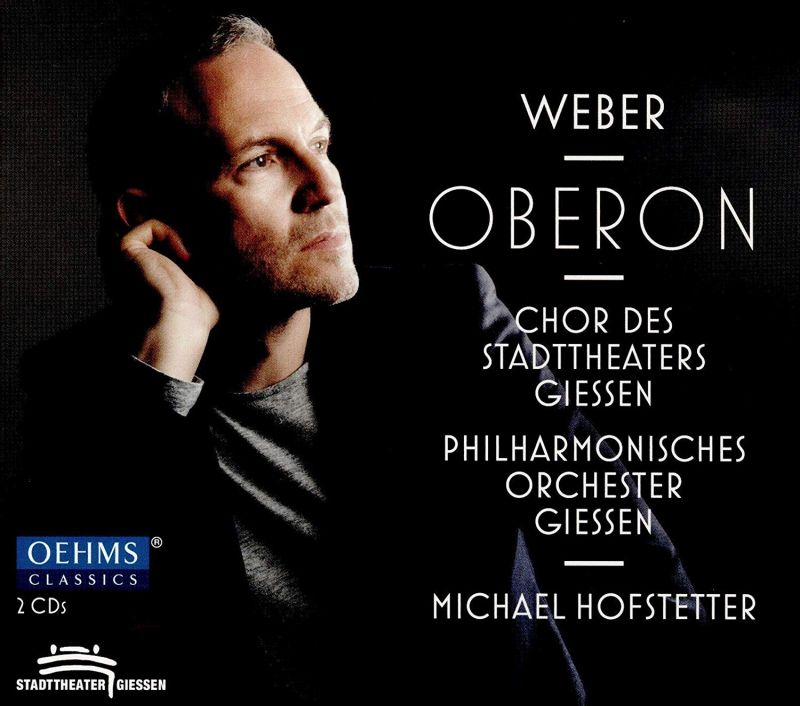WEBER Oberon (Hofstetter)
View record and artist detailsRecord and Artist Details
Composer or Director: Carl Maria von Weber
Genre:
Opera
Label: Oehms
Magazine Review Date: AW2019
Media Format: CD or Download
Media Runtime: 111
Mastering:
DDD
Catalogue Number: OC984

Tracks:
| Composition | Artist Credit |
|---|---|
| Oberon |
Carl Maria von Weber, Composer
Carl Maria von Weber, Composer Clemens Kerschbaumer, Oberon, Tenor Dmitry Egorov, Puck, Countertenor Dorothea Maria Marx, Reiza, Soprano Giessen Philharmonic Orchestra Giessen State Theatre Chorus Giessen State Theatre Orchestra Grga Peroš, Sherasmin, Baritone Marie Seidler, Fatima, Mezzo soprano Michael Hofstetter, Conductor Mirko Roschkowski, Huon, Tenor Roman Kurtz, Narrator, Speaker |
Author: Mark Pullinger
How the English audiences must have been confused by the plot. It’s an odd story, the only Shakespearean aspect being a quarrel between Oberon and Titania which has resulted in their refusing to be romantically reconciled until they find a pair of human lovers who will remain faithful to each other through thick and thin, a rash vow Oberon regrets. Puck informs his master that the Emperor Charlemagne has ordered his knight, Sir Huon, to Baghdad to wed the daughter of the Caliph, Haroun al Rachid. Oberon decides Huon may be his hope of marital salvation and presents him with a magic horn to summon help on his quest. The result is a hybrid between medieval chivalry and the Arabian Nights. Musically, Oberon shows the influences of Mozart’s Die Entführung aus dem Serail and Die Zauberflöte (there’s even a tenor phrase in one ensemble that hints at Tamino’s ‘Portrait’ aria).
Weber had resolved to rewrite the work on his return to Germany, but died in London seven weeks after the opera’s premiere. So how best to perform Oberon? Near-impossible to stage, you’d be most likely to encounter this uneven work via a concert performance, such as that conducted by Sir John Eliot Gardiner at the Edinburgh Festival in 2004, following which came his Philips recording, or the performance captured here by Oehms from the Stadttheater Giessen under Michael Hofstetter.
Whereas Gardiner presents the work in English, Hofstetter – not unreasonably – adopts Theodor Hell’s German translation, both eschewing spoken dialogue in favour of a single narrator. For all the merit in Hofstetter’s decision to record Oberon on period instruments (as does Gardiner, of course), the reverberant acoustic negates the effect, the punchy playing of the Philharmonisches Orchester Giessen often getting lost in a soggy mush of sound. There are some lovely moments in Weber’s orchestral score, such as elfin strings and Mozartian Janissary percussion effects. It’s interesting to hear the influence Weber had on the following generation too, notably Wagner; there’s a trumpet figure in ‘Ocean! thou mighty monster’ which bears a remarkable similarity to the sword motif from The Ring.
Alas, the singing here is nothing special. As the heroic Huon, Mirko Roschkowski’s intonation is poor and his ornamental flourishes in ‘Von Jugend auf’ are extremely clumsy. He pales in comparison with the splendid Jonas Kaufmann (for Gardiner) or Plácido Domingo (who featured in the first complete recording on DG under Rafael Kubelík). Soprano Dorothea Maria Marx makes a good fist of Reiza (the Caliph’s daughter), even if she doesn’t have the same heft as Birgit Nilsson, who takes the role so magnificently for Kubelík.
Clemens Kerschbaumer is wobbly in the secondary tenor (albeit title) role of Oberon, with far too much vibrato employed for comfort. As the secondary couple, Marie Seidler has the right scale of voice for Fatima but Grga Peroš aspirates heavily as Sherasmin. Dmitry Egorov’s hooty countertenor is an odd casting decision as Puck – a nod to Britten’s Oberon? The narration is grandly declaimed by actor Roman Kurtz, a far cry from Roger Allam’s cosy English text for Gardiner, which maintains a more magical atmosphere.
Despite its problems, there’s some lovely music to enjoy in Oberon. If you want a version in English, Gardiner is your only (very recommendable) choice; for German – and with dialogue spoken by actors – Kubelík is still the prime Puckish pick.
Discover the world's largest classical music catalogue with Presto Music.

Gramophone Digital Club
- Digital Edition
- Digital Archive
- Reviews Database
- Full website access
From £8.75 / month
Subscribe
Gramophone Full Club
- Print Edition
- Digital Edition
- Digital Archive
- Reviews Database
- Full website access
From £11.00 / month
Subscribe
If you are a library, university or other organisation that would be interested in an institutional subscription to Gramophone please click here for further information.




